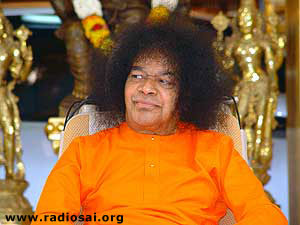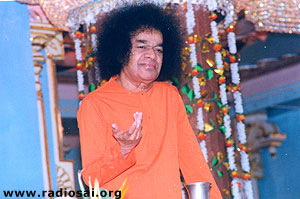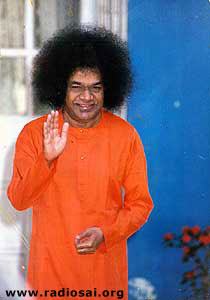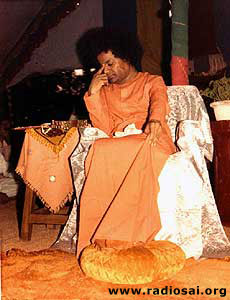| |
(Hislop and an interpreter were having breakfast with Swami. Two men, Mr. XY and Mr. CD, entered the room, and Mr. XY fell at Swami's feet. He was in tears, and it was obvious that some grave and sad errand had brought him to Swami. Hislop and his companion immediately left the room. Shortly, the two men left and Baba called Hislop and the companion into His presence again. Names of persons have been changed so as not to disclose identities).
The Real Relative
 |

|
SAI: The case of Sri XY will illustrate how Swami takes care of His devotees. When Sai's mother died, the summer course was on. Sai sent the body to Puttaparthi, but did not accompany it. His duty was the summer course. At the XY house, there were only the women and the body of Mrs. XY. Nobody to take care. Not even a priest to chant the required Vedic hymns. Swami drove directly from Prasanthi Nilayam to the XY house taking a Vedic priest from the ashram in the car with Him. Swami comforted the women and made all the needed arrangements before driving on to Brindavan. Then He sent a senior man from the Brindavan household to the house so that the ladies would not be alone in the house overnight. Sai is the close and the real relative of His devotees. The ladies of the XY household left their sorrow and all became happy with Sai's shower of grace.
H: Swami was not told, but somehow He must have known when the lady died?
SAI: Swami knew well before the time of her death. He made all the necessary arrangements at that time, even sending a special message to Hislop on Tuesday the 16th that the college celebration would not be held on the 25th, but not to tell the students. Mrs. XY was born on a full moon day and she died on a full moon day.
Swami Answers Our Prayers
H: Why did she die? Was it that her time to die had arrived?
SAI: Her time to die arrived several years ago. But she prayed to Swami that before she died she wanted to see her grandson married, and she wanted to witness the celebration of Swami's birthday. Swami granted her prayer. She also had a third desire, although she did not mention it. She had the desire that prior to her death she would spend some days with her youngest son.
When she was at Prasanthi Nilayam in November, she said to Swami that her grandson had married and that she was now witnessing Swami's birthday celebration and that she was now content to die anytime. Her major desires in the life had all been fulfilled. Swami replied that if she died now, her husband, who was abroad, would not be here. She said that Swami was here and that she was holding to Him and to nobody else. Swami told her that she should go to the city of her youngest son and visit him for some days, and she did so.
On Dec. 18th, she was to return to her own home because her husband would arrive home from his trip abroad on Dec. 19th. On the 18th her son was driving her to the airport and she was talking to him from the back seat of the car. Then, there was no further talk from her. She became silent. The son turned to look and saw her fallen on her side. She was gone.
 |
 |
H: Without any pain?
SAI: No pain, no suffering. She was in good health and was gone in an instant. The son turned the car and returned home. Had the mother died at the airport, the body would have been impounded. The son turned the car around on the highway and immediately drove home. When he got to his house there was a phone call from Baba waiting for him. Baba had instructed one of the Ashram officials to place the phone call with the message to 'send the body at once to your father's house'. The Ashram official was puzzled at the message, since he knew nothing about 'a body.’
Swami then phoned Mr. CD, the man who just now brought Mr. XY to Swami, and had him fly to Bombay to meet Mr. XY at the airport and bring him to Brindavan. That was the occasion that you just now witnessed. Mr. CD was not to tell XY about the death of his wife until such time as they were just about to arrive here. When you saw XY, he was overcome by the sudden news. The sequence of events was perfectly harmonized. When devotees surrender their lives to God and obey Him, He takes the full responsibility and cares for His devotees even to the smallest detail.
One last point. When Swami reached the XY home after driving there from Prasanthi Nilayam, He arranged that the body be properly prepared and would remain so until XY drove home after seeing Baba and being comforted by Him. Thus, by harmoniously relating all details, Swami even allowed XY to see the features of his wife and take the correct farewell.
H:Swami! Here just now we actually witnessed a part of this amazing story. How can all that be? Swami holds the entire universe in His Hand. He bears the responsibility for the inconceivable, immense universe. And how can He at the same time give this detailed attention to the lives of individual devotees?
UNIVERSAL AND INDIVIDUAL ATTENSION
 |
 |
SAI: It is as you say. Swami holds the universe in His Hand. But devotees learn of the glory and majesty, through Swami's attention to each one, personally. That Swami holds the universe yet at the same time fully cares for the lives of His devotees even to the smallest details is a measure of His glory that the devotee can understand.
H: Swami! How is it that Swami makes a perfect harmony in one case, as with the death of Mrs. XY, and yet in another case, that of which we were speaking just before XY arrived, there is anything but harmony; indeed, there is a highly imperfect situation?
This is a big puzzle.
SAI: It depends on the people involved. In the case of a devotee who has pure thoughts and a pure heart and who has surrendered to Bhagavan, then Swami takes full responsibility for that life and takes care of that devotee. But where a person has a big ego, relying on ego desire and not on Bhagavan, then Swami keeps at a distance and does not interfere.
H: Oh. I see the difference.
DESIRE AND CRITICISM
SAI: Swami could make the situation perfect in regard to that individual. But where there is a big ego and the person wishes to follow ego desire, Swami does not interfere, but allows the person to do as he wishes.
H: Swami says to cut the very roots of desire. What does "cutting the roots" mean?
SAI: If desire comes, analyse it. If it is good for you and not harmful to others, go ahead. If not good, put it aside at once. If you are uncertain, do nothing until the uncertainty is clarified.
H: Is it wrong to criticize a person?
SAI: It is not wrong to criticize a person if the evaluation has been arrived at slowly and carefully.
MEDITATION, CONTEMPLATION AND CONCENTRATION
A Visitor: How to get enough faith for even meditation? There is no time.
SAI: Not true. We always have enough time to talk, visit the cinema, etc. There is certainly time for meditation.
A Visitor: After meditation, there is a feeling of strength. Where does that power come from and what is its relation to meditation?
SAI: The power is from God. The relationship between God and the devotee is love. It is almost impossible to be aware of the relationship with God. God is the subtlest of the subtle, and the relationship with Him is of the same subtlety.
A Visitor: Swami said that meditation twice a day is best?
SAI: Early morning is best. Mind is quiet and there is not the pressure of responsibilities.
H:Is meditation from time to time during the day all right?
SAI: There is difficulty during the day. People are around, and there is work. If meditation is attempted, even work suffers.
A Visitor: What is meditation?
SAI: Real meditation is getting absorbed in God as the only thought, the only goal. God only, only God. Think God, breathe God, love God.
Visitor: What about concentration?
SAI: Concentration means when all senses fall away and there is only God. The concentration of Ramakrishna Paramahamsa was naturally so strong that he grew something of a tail when meditating on Hanuman, the monkey. His body was just a changing bubble, his concentration was so strong. Special work on concentration need not be a part of meditation. Concentration is already in force wherever mind, intelligence and senses are used. Without it you could not even walk. It needs no special practice. It is below the senses. Meditation is above the senses.
In between concentration and meditation, like a separation between the two, is contemplation; concentration to contemplation, then meditation. As long as one thinks 'I am meditating,' that is the mind and is not meditation. As long as one knows he is meditating, he is not meditating. In that absorption in God, one puts aside every form and merges into God. In that process the mind naturally stops.
A Visitor: Baba says to cut off (divine) form in meditation, but we worship Swami's form.
SAI: That is all right. But when one comes close to Baba, the visualization is abandoned. At this moment, you are looking at Baba directly. Are you still visualizing?
SELF ENQUIRY
A Visitor: What should I do? My meditation is the inquiry, 'Who am I?'
SAI: The Ramana Maharshi inquiry by itself is not good. It must be combined with meditation. Meditation for its proper practice, should be at the same place, at the same time. In that way, it surely will be successful. If one is away from home in travel, in his mind he can go to the accustomed place no matter where he is.
To search for truth is needless. Truth is in every place at all times. One must live truth, not search for it. 'Kohum' (Who am I) is the cry of the newborn child. After a life-time of sadhana, the old man says, 'Sohum' (I am God). When away from Swami, by remembering Him doing this or that, the battery is 'recharged'. That also is genuine meditation. Meditation is constant inner inquiry as to who am I, what is true, what is ego action, what is loving and what is harsh. Meditation is thinking on spiritual principles, searching out the application to oneself of what Baba says, and the like.
Pranayama and Pratyahara
H: Swami praises Pranayama and Pratyahara.
SAI: First there is control of the outer senses, then control of the inner senses, then a sense of balance with a limitation to freedom, because freedom is the end of wisdom. Then comes Pranayama and Pratyahara.
H: But Swami praises the two. In which way should devotees act on that?
SAI: All of these, like Hatha Yoga and so on, are like exams. You study and pass the exam and then you feel confident and proud. It is like going to college. There are eight principle stages and you work and reach each one. But they are necessary only if you go to college. For the one who has completely surrendered to God and whose heart is filled with love for God, these 'college courses' are not needed and have no meaning and are quite unnecessary.
(To be continued...)
– Heart2Heart Team

|
|







